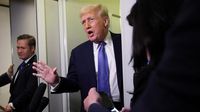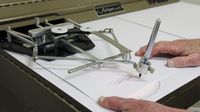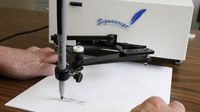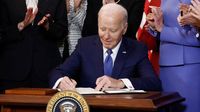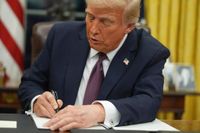On March 17, 2025, former President Donald Trump stirred controversy by claiming President Joe Biden's recent pardons for members of the January 6, 2021, House committee are invalid due to Biden's use of an autopen, a machine used to replicate signatures. Trump, who made his assertions via his social media platform Truth Social, declared the pardons "VOID, VACANT, AND OF NO FURTHER FORCE OR EFFECT" due to what he describes as Biden's failure to personally sign them.
Trump's critique came as part of his broader discourse surrounding the January 6 events and his persistent concern about how the Justice Department is handling investigations related to those actions. He argued, without providing evidence, "the pardons... are void... because they were done by Autopen." This reflects not only his frustration over the ramifications of the January 6 attack but also his deepening animosity toward Biden's administration.
To understand the roots of Trump's claims, one must first grasp what exactly the autopen is. An autopen is a mechanical device used to reproduce signatures and has been employed by various public figures, including presidents, for decades. Its usage allows for quicker signing of documents amid the heavy paperwork burden of governance. Historically, the autopen has not been seen as controversial; it was first patented as a polygraph machine back in 1803.
Legally speaking, the Office of Legal Counsel at the U.S. Justice Department issued guidance in 2005 affirming the constitutionality of using autopens for signing bills and other official documents. The legal opinion stated emphatically, "the President may sign... by directing a subordinate to affix the President's signature to such a bill, for example by autopen." This effectively means Biden’s potential use of the autopen for signing pardons aligns with legal expectations set forth by previous administrations.
Criticism of Biden's pardon decisions has been amplified by the Oversight Project, part of the conservative Heritage Foundation. Their analysis suggested most of Biden's signatures, including those of pardons, were made using the autopen. They raised concerns, pointing out discrepancies where some of Biden's pardons were documented as being signed on days he was not physically present at the White House.
Experts have weighed in on the ramifications of Trump's allegations. Carl Tobias, a law professor at the University of Richmond, affirmed, "the Constitution... imposes no...limitation" on how presidential pardons can be executed. This suggests the legality of pardons issued by Biden, regardless of whether they were signed by hand or autopen, remains intact. Legal scholars broadly contend the clemency powers granted to presidents, as outlined in Article II of the Constitution, allow for considerable flexibility.
Trump's fixation on the autopen issue could be seen as both strategic and symbolic. By alleging Biden does not have full control over the presidential actions he undertakes, Trump seeks to form narratives around Biden’s competency. He noted during his commentary, "...more significantly, he did not know anything about them!" emphasizing his belief purportedly rooted in concerns over Biden’s cognitive ability.
While these controversies proliferate within political discourse, the reality remains: the use of autopens is not unique to Biden. Various leaders, including Barack Obama, used them for signing legislation, with Obama first utilizing the device to sign the Patriot Act extension from abroad during the G8 summit back in 2011. Other presidents, including Lyndon B. Johnson and Harry Truman, also employed autopens during their terms. Johnson even embraced the practice publicly, allowing photographs of his autopen to be taken.
The broader legal framework suggests there is little merit to Trump's claims of invalidity concerning Biden's pardons. Jay Wexler, a constitutional law professor, stated the argument fails fundamentally, arguing there is no constitutional requirement dictifying pardons must be manually signed. "The argument... fails at the get-go, because there’s no requirement... even be signed," he pointed out.
It’s worth noting the dynamic between political accusations and perceived legal standing is complex. Trump’s call to investigate Biden's pardons could set off renewed contention around presidential powers and their limits. If Trump attempts to disrupt these pardons legally, he faces challenges; the Constitution does not allow for the revocation of pardons once granted.
For now, the debate around autopen use has taken center stage as politicians navigate the murky waters of constitutional law and executive authority. With past presidents having utilized the very same technology, the question linger: Do Trump’s claims serve as mere political theater aimed at sowing doubt about Biden’s authority, or do they signify something more significant about the nature of presidential accountability?
Regardless of the outcome, it is clear the autopen has become synonymous with the current political narrative, serving as both a literal and figurative representation of the divide among lawmakers on significant national issues.
